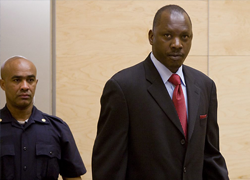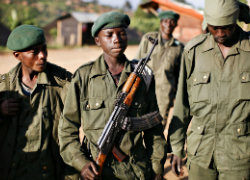After ten years, the International Criminal Court issued its first verdict on March 14th, finding Congolese warlord Thomas Lubanga guilty of three child soldier related war crimes offenses: conscripting, enlisting, and using child soldiers. The trial phase of the case concluded this summer when the ICC sentence Lubanga to 14 years in July. The paltry sentence is a shaky conclusion to a case that has been troubled from the beginning.

Controversy first appeared when the Prosecution team charged Lubanga only with the child soldier offenses. The prosecution surprisingly did not indict Lubanga with the substantive crimes committed by the child soldiers, namely thousands of instances of murder and rape. It is standard fare for tribunals to charge military commanders for the crimes committed by their subordinates, and so the Lubanga indictment seemed conspicuously narrow and unrepresentative of the mass crimes in the Ituri region of the Congo in which 60,000 were killed. And the indictment rankled many because of its failure to reflect the widespread commission of gender crimes.
The start of the trial saw the proceedings immediately halted over allegations of impropriety by the prosecution in its reliance on investigative “intermediaries.” It turns out the prosecution paid Congolese civilians to help them in the Congo. The “intermediaries” helped prosecutors identify and locate witnesses during its investigation, a practice which the court found in the trial judgment to be a misplaced delegation of responsibilities. The court indicated that several intermediaries may have facilitated false testimony. The prosecution did itself no favors by stubbornly defying direct court orders to disclose the names of intermediaries to the Lubanga defense team.

(Boston.com)
Despite this rough beginning, an appropriate judgment and sentence would have gone a long way toward erasing the memory of the ignominious start. But there would be no such luck. The court issue sentences of 12, 13, and 14 years for the “enlisting”, “conscripting”, and “using” counts respectively, a sentence that does not seem commensurate with Lubanga’s role in the mass slaughters or the enslavement and brutalizing of children. Adding insult to injury, the court ordered the sentences to be served concurrently and imposed an actual sentence of 14 years. The court had the option of ordering the sentences to be served consecutively — up to a 30 year maximum. Even better, it could have issued a life sentence.
The BBC reported at the time of the sentencing that Mike Davis, from the human rights organisation Global Witness, said that “the sentencing of Lubanga was an ‘important development’ but that it sounded like ‘a rather low sentence in relation to the crimes that he committed.’” Congolese government spokesman Lambert Mende “agreed that he should have been jailed for longer…” Mende diplomatically offered that the meager sentence was at least a “positive signal” for peace in the region.
In his sentence, Judge Adrian Fulford went out of his way to compliment Lubanga for his conduct and cooperation during the trial and critical of the prosecution. And Fulford lambasted the prosecution.
I am not defending the prosecution in Lubanga, but it should never be the case that a prosecutor’s conduct ever serves as mitigation in the sentence of a war criminal (just as the conduct of the defense attorney can never constitute an aggravating factor). Criminal sentences can only be issued on the merits of the case. Punitive measures against a prosecutor should be an entirely independent action.
Receiving credit for his six years of pre-trial detention, the 51 year old Lubanga has eight years remaining on his sentence – a term that could be significantly lessened for good behavior. It is a sweet deal for Lubanga, but the latest in a long string of bitter pills the Congolese have had to swallow.
At the very least, one hopes Lubanga’s deal is sweet enough to cause Sudanese President al Bashir to rethink his refusal to submit to the court’s jurisdiction.


